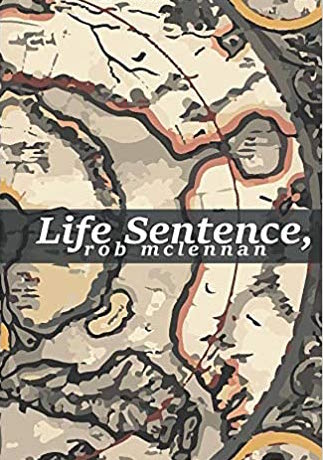
Life Sentence,
rob mclennan
Spuyten Duyvil, 2019
Review by Margo LaPierre
Life Sentence, (the unusual punctuation is deliberate, you’ll see) is a poetry collection that begins quietly, with much purpose, and picks up speed as it goes along like a river wending its way through springtime. rob mclennan commences the book with a dedication to his father, which opens to a spare, image-rich account of his father ill with cancer: locked in his body, in silence, in hospital. Metaphors of the self as a flowing thing abound. We know that flows can weaken, dry up, or be disrupted:
Hand, white hand of rain. Biopsy, cures. Have yet to centre. What was not, derailed. Amend, deleted. Current. Disputed streams. Railing, spillway, creek. A sated, broadband. Record, disposition.
Life-flow, as it etches forward, can also accumulate, become torrential. We witness this in the trajectory of the collection. mclennan records his father’s illness, memories of his late mother, and his own experience of finding love and its progressions: becoming a husband, becoming a father:
Situational: two-fold. Become as we become, parents and unparented. A continuation, sequenced. My daughter, a small plastic duck. In earth rotation, heavens. Will to overcome.
mclennan’s language is deliberate, and thanks to his clever and controlled use of punctuation, the poems tell readers exactly how they would like to be read. Short sentences are structured in a way that suggests balance, an equivalence between asymmetric elements. Some words that you’d otherwise wing past gain new meaning. The result is an underlying sense of composure. As I read these poems, I had the sense of sitting surfside, listening to waves come in and out—the rhythm had that same sense of inhalation/exhalation, both evoking the basic function of the body and also the tidal nature of the planet itself. Wave in, wave out. Breath in, breath out. Connections between the body and natural terrain are drawn more explicitly throughout the book, but this structural parity creates a potent atmosphere that would have been near impossible to achieve through word choice alone. How does mclennan do this? Through distinctive use of punctuation, particularly the comma. For example:
Colon, semi-colon. Stop. Just stop. A sentence, shortened. This long sentence, long. Perilous, condensed. Where you have gone. The river’s slowness, lake. The slowness of these phrases. A most satisfying taste.
What do signs, maps, signals, latitudes, and in some cases, currents all have in common? They are signifiers, they refer to natural phenomena, natural terrain. Such is the case with language, and I get the sense that mclennan sees language as a physical representation of the body—one that is parallel; that never quite touches the body, reality, or experience, but runs alongside it, mapping it out. In the collection’s final notes, mclennan writes that he’s long been taken with bpNichol’s idea of a “poem as long as a life.” mclennan states that he prioritizes the process over narrative, but that nonetheless the contents of his poems are taken from moments in his own life. What we get is a textural account of an era of his life. Confessional poetry, this is not. It’s as though the language of mclennan’s life is as important as the life lived, and once again, there’s that one-to-one ratio that distinguishes this work. My favourite moments of the book were in the understated accounts of new love—the heightened, loving details work well under mclennan’s close-up, granular focus.
Speak, a river. Deepening. Construct a voice. What is a dream. Salacious, taste. Ceramic. Porcelain, she reaching.
Claims. Baggage, format. Clear-eyed. Ovulatrix. Standard, in compulsion.
Registry, conflates. We have been married, days. We list the age, require metric. Parlour, as an outburst. Stillness, leisure. Serious cakes. This plunge.
Life Sentence, is at once joyful, measured, contemplative, engaged. Readers living in Ottawa will enjoy the Bank Street poems (especially since the recent health crisis has restricted us from leisurely wandering down busy city streets). Cat-lovers like myself will enjoy the appearance of a polydactyl kitty. With this book, mclennan traces the fullness of a life, while rejoicing and grieving the blows and treasures of being given life, and also giving it.
Margo LaPierre (www.margolapierreeditor.com) is a Canadian poet and editor. Her debut collection of poetry, Washing Off the Raccoon Eyes, was published by Guernica Editions in 2017. She is Arc Poetry Magazine’s newsletter editor. Her work has been published in filling Station, CAROUSEL, Train Journal, and others. She/her. @margolapierre